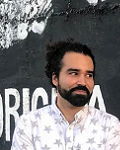2021, 2022
Omar Ramadan-Santiago
- Postdoctoral Fellow
- Stanford University

Abstract
Among Puerto Rico’s Rastafari population exists a divergent construction of blackness that is spiritual and diasporic. This project examines how the Rasta community constructs, imagines and embodies blackness as a personal, political, and spiritual identity. Despite dominant constructions of race in Puerto Rico that position a number of the Rastas as non-black (a privileged categorization), they refuse this categorization in favor of choosing identification with blackness, not just as a racial but also a spiritual identity. Rastafari has influenced a number of its adherents to critique the construction of blackness and black identity formation in Puerto Rico, to instead create their own “spiritually black” expression. In doing so, they demonstrate the metaphysical nature of race, thus interrogating how race and racial identification has historically been constructed and understood.
Dissertation Abstract
"Dios en carne: Rastafari & the Embodiment of Spiritual Blackness in Puerto Rico"
In my dissertation, I examine how the Rastafari community in Puerto Rico constructs, reshapes, imagines and embodies blackness as a personal, political, and ideological identity. I argue that my interlocutors refuse non-black privilege and choose blackness, an act that is understood as identification not with subjugation but with power. I consider their identification with blackness and enactment of this identity as a performance. My analysis, based on 22 months of ethnographic research, and utilizing ethnography, participant observation, and semi-structured interviews, explores how my interlocutors claim blackness as a spiritual identity. In doing so, they demonstrate the metaphysical nature of race thus complicating how race and racial identification has historically been understood. To best investigate this construction, reworking, and adoption of a spiritual blackness among Puerto Rican Rastas, I engage with the concepts of the social construction of race, identity formation and performance, and the racialization of religion.
In my dissertation, I examine how the Rastafari community in Puerto Rico constructs, reshapes, imagines and embodies blackness as a personal, political, and ideological identity. I argue that my interlocutors refuse non-black privilege and choose blackness, an act that is understood as identification not with subjugation but with power. I consider their identification with blackness and enactment of this identity as a performance. My analysis, based on 22 months of ethnographic research, and utilizing ethnography, participant observation, and semi-structured interviews, explores how my interlocutors claim blackness as a spiritual identity. In doing so, they demonstrate the metaphysical nature of race thus complicating how race and racial identification has historically been understood. To best investigate this construction, reworking, and adoption of a spiritual blackness among Puerto Rican Rastas, I engage with the concepts of the social construction of race, identity formation and performance, and the racialization of religion.

